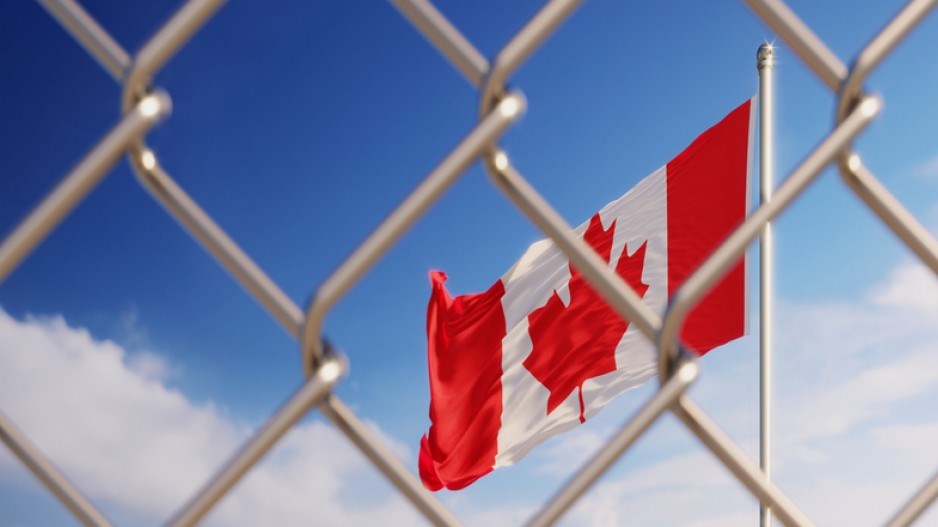Canada should be letting third-country refugees from the U.S. into Canada despite the border being closed to help prevent the spread of COVID-19, refugee and civil liberties organizations say.
“The right to seek asylum, to seek refuge, cannot and must not be compromised in the midst of this global pandemic,” Canadian Council for Refugees president Dorota Blumczynska said. “It is abhorrent to turn away refugees who have every legal right, under both Canadian and international law, to enter Canada in order to save their lives.”
And, B.C. Civil Liberties Association executive director Harsha Walia said barring refugees is not necessary to preserve public health.
“Refugees must be actively included in, not excluded from, our public health response,” she said. “Refugees have a right to safety, and the COVID-19 pandemic is a global one; we can’t displace the pandemic beyond our borders.”
Prime Minister Justin Trudeau said anyone crossing into the country at the Canada-U.S. border on foot to claim asylum would be turned back. It was announced as just one measure included in the temporary border closure aimed at combating COVID-19’s spread.
Currently, refugees entering Canada from the U.S. to make an asylum claim will be sent back to the U.S., and vice versa.
However, the groups’ news release notes the majority of refugees are crossing at one entry point, ensuring “orderly processing into the refugee system, and fulsome application of public health measures.”
That entry point, confirmed Canadian Council for Refugees executive director Janet Dench, is in upstate New York, the state hardest hit by COVID-19 in the U.S.
As the New York death toll approached 2,000 Monday, New York City hospitals began shipping patients upstate.
The Canadian Association of Refugee Lawyers and Amnesty International have joined Walia and Blumczynska’s groups in condemning the closure to refugees as a violation of international law.
With Refugee Rights Day marked in Canada April 4, the groups said the prohibition on refugee arrivals at the land border is a grave threat to refugee rights.
Blumczynsk said Ottawa and public health officials have the means to put in place self-isolation requirements for arriving refugee claimants.
“Refugee claimants, including families with children, are equally invested in the wellbeing of their loved ones, their neighbours and friends and would pose no greater threat to public health than arriving international students or temporary foreign workers,” the groups said in a statement.
They said turning back refugee claimants to the U.S. violates Canada’s legal obligations under the 1951 Refugee Convention, protected rights in the Charter of Rights and Freedom, and could violate the Convention against Torture.
“Canada’s decision is out of step with public-health measures designed to curb the spread of COVID-19, and runs counter to our international legal obligations. From moral, public health and legal perspectives, closing the border to refugee claimants is wrong,” Amnesty International Canada secretary general Alex Neve said.
The UN High Commissioner for Refugees (UNHCR) said March 31 while countries are closing borders and limiting cross-border movements, international human rights and refugee protection standards can be upheld through measures including not returning them to countries where they are subject to persecution, quarantine and health checks.
“This disease can be controlled only if there is an inclusive approach which protects every individual’s rights to life and health. Migrants and refugees are disproportionately vulnerable to exclusion, stigma and discrimination, particularly when undocumented,” the UNHCR said. “To avert a catastrophe, governments must do all they can to protect the rights and the health of everyone. Protecting the rights and the health of all people will in fact help control the spread of the virus.”
Canadian Association of Refugee Lawyers president Maureen Silcoff said if Canada maintains the current policy, Ottawa should secure assurances that refugee claimants turned back and into U.S. Immigration and Customs Enforcement custody are not returned to their country of persecution or placed into immigration detention.
“Canada should also commit that such claimants will be able to return to the border after the crisis is over, without prejudice to their ability to seek refugee protection in this country,” Silcoff said.
Health Canada referred questions to Immigration, Refugees and Citizenship Canada.
@jhainswo




